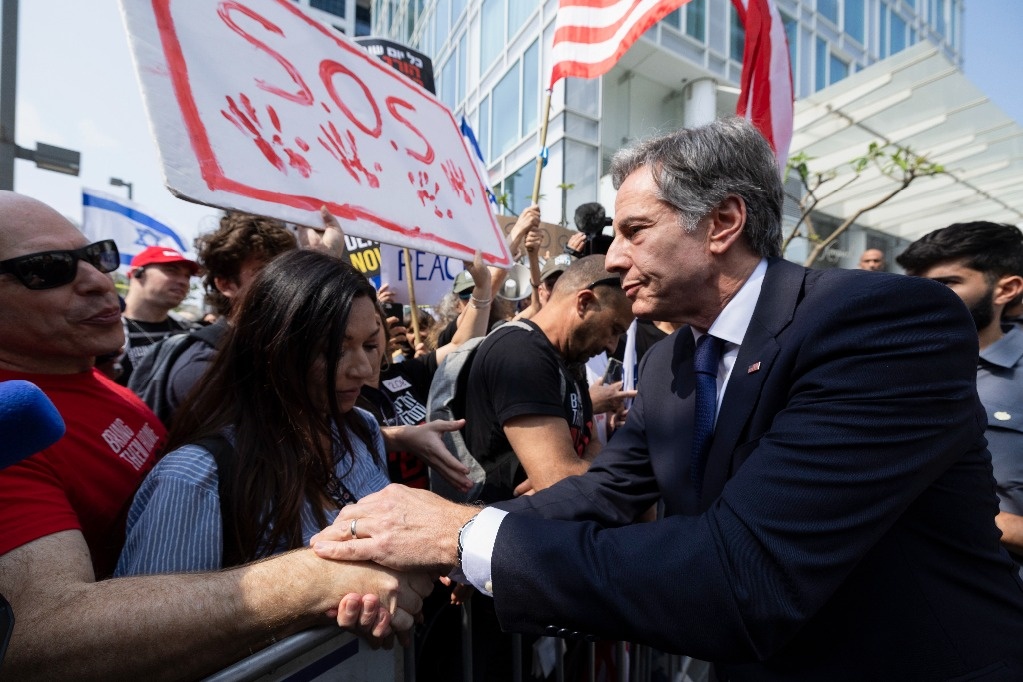Ashdod. US Secretary of State Antony Blinken on Wednesday urged Hamas to accept the new truce proposal in the Gaza Strip and reaffirmed his opposition to an Israeli invasion of Rafah, in the south of the war-torn Palestinian territory.
Blinken stated in Tel Aviv that the United States is determined to achieve “a ceasefire that brings the hostages home, and to achieve it now,” referring to the dozens of kidnapped people who remain in the hands of Hamas since the start of the war on October 7.
The truce proposal, mediated by Qatar, Egypt and the United States, is “extraordinarily generous on Israel’s part,” considered the diplomat, on his seventh visit to Israel since the conflict broke out.
If the Islamist movement, in power in Gaza, “really intends to care about the Palestinian people and wants to see immediate relief from their suffering, it should accept this agreement,” he added.
The proposal includes a 40-day truce and an exchange of hostages held in Gaza for Palestinians imprisoned in Israel.
Hamas will give its response “in a very short period of time,” Suhail al Hindi, a senior leader of the Palestinian movement, told AFP, emphasizing that the ceasefire must be permanent.
A senior Israeli official indicated that Prime Minister Benjamin Netanyahu’s government will wait until Wednesday night for Hamas’ response and then decide whether to send a delegation to Egypt with a view to a possible agreement.
“Other ways” to confront Hamas
Blinken also reiterated the United States’ opposition to an Israeli ground operation in Rafah, where 1.5 million Palestinians, most of them displaced by the conflict in other areas of the Gaza Strip, survive in extreme conditions.
“There are other ways — and, in our view, better ways — to address the real current challenge from Hamas, which do not require a military operation” in Rafah, Blinken said after meeting Netanyahu in Jerusalem.
Hours before Blinken arrived in Israel, Netanyahu reaffirmed his intention to invade Rafah, before or after a truce, considering that this town constitutes the last stronghold of Hamas.
“We will enter Rafah and eliminate Hamas battalions, with or without agreement [de tregua]to achieve total victory,” he declared.
The conflict erupted on October 7, when Islamist commandos killed 1,170 people, mostly civilians, and kidnapped about 250 in southern Israel, according to an AFP tally based on Israeli data.
A week-long truce in November allowed a hundred hostages to be exchanged for 240 Palestinian prisoners. Israel estimates that 129 people remained captive, of whom 34 reportedly died.
The air and ground offensive launched by Israel in retaliation against Hamas has so far left 34,568 dead, mostly civilians, according to the Gaza Ministry of Health.
At least 33 people died in the last 24 hours in the Palestinian territory, according to the same source.
In the early hours of the morning, the Israeli army bombed northern and central Gaza, including the Nuseirat refugee camp, where several witnesses reported clashes between Palestinian fighters and Israeli soldiers.
Colombia breaks relations with Israel
The president of Colombia, Gustavo Petro, announced that starting Thursday his country will break diplomatic relations with Israel and described Netanyahu as “genocidal.”
“If Palestine dies, humanity dies,” said the left-wing president amid shouts of support in a central square in Bogotá.
Israeli Foreign Minister Israel Katz was quick to respond, stating that Petro “had promised to reward Hamas murderers and rapists and today he has delivered.”
Humanitarian aid
In addition to the bombings, Palestinians in Gaza suffer from food shortages, as foreign aid, strictly controlled by Israel, arrives in dribs and drabs, mainly from Egypt.
Blinken visited Kerem Shalom, one of the border crossings between Gaza and Israel, where dozens of trucks await authorization to enter Palestinian territory.
The United States is building a floating dock on the Gaza coast to receive shipments, which should begin operating on Thursday.
The war has also caused immense destruction in the narrow territory, where there is now more rubble and ruins to remove than in Ukraine, which has faced a Russian invasion for more than two years, a UN official said in Geneva.
Mungo Birch, head of the UN demining service in Gaza, explained that clearing 37 million tons of rubble, according to a UN estimate made in mid-April, is more dangerous and costly, due to the presence of devices unexploded explosives and asbestos.
#urges #Hamas #accept #truce #proposal #Gaza #Strip
– 2024-05-03 06:08:33
